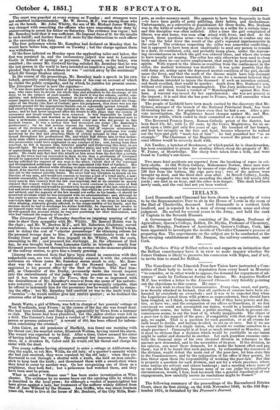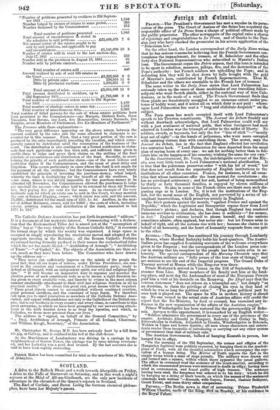IRELAND.
Lord Dunsandle and Claneonel has been clime by a majority of votes to be the Representative Peer to sit in the House of Lords in the room of the Earl of Charleville, deceased. Lord Dunsandle is a resident Irish landlord, and is reputed to be a man of strong common sense and clear judgment. He served for several years in the Army, and held the rank of Captain in the Seventh Hussars.
A Government Commission, consisting of Dr. Hodges, Professor df Agriculture, Queen's College, Belfast, Dr. Blythe, Professor of Chemistry, and Mr. Murphy, Professor of Agriculture, Queen's College, Cork, lets been appointed to investigate the merits of Chevalier Claussen's process of preparing flax. The experiments on the subject are to be conducted at the flax-steeping establishment of Mr. Dugan, the railway-contractor, near Cork.
The Northern Whig of Belfast refers to and supports an intimation that the Belfast constituency have it in view to make inquiry whether Sir Janie§ Graham is likely to preserve his connexion with Ripon, and if not, to, invite him to stand for Belfast The Guardians of the Limerick Poor-law Union have instructed a Com- mittee of their body to invite a deputation from every board in Munster "to consider, or in other words to oppose, the demand for repayment of ad- vances" made by Parliament during the famine. Mr. Augustus Stafford M.P. has written a letter to the Limerick Chronicle very forcibly pointing out the objections to, this course. He says— "I do not wish to abuse the Commissioners. Every class, creed, and party, is to fiercely attacked in Ireland, that all epithets of censure have been ex- hausted by everybody on everybody and it was to be expected that when the Legislature armed them with powers so unprecedented, they should have been tempted, as I think, to misuse them. But if they have powers and du- ties, so have we • and the resignation of our offices as Guardians, if we feel convinced we could not accomplish our duties, would be a businesslike and intelligible course, far better than a i public meeting, which in present cir- cumstances seems, to say the least of t, wholly inapplicable. The object of a poor-law is the support of the poor; if compatibly with that object we can pay, we ought. That is a question for each guardian, or at all events for each board to decide, and having decided, to act on at once. But if we are to exceed the limits of a single union, why should we confine ourselves to a single province ? Connaught is at least as much interested as Munster, and it must be obvious that a decision which would be justifiable in one union might be Unfair and shameful in another. Let each guardian examine care- fully the financial state of his own electoral division in reference to the amount now demanded, and to the necessities of its poor. If the division, in his opinion, can meet these demands, let it make the honest effort and pay them ; but it be found that such payment, by exhausting the resources of the division, would defeat the main end of the poor-law, let him state this to the Commissioners, and by the resignation of his office if they persist, let him throw upon them the responsibility of working the poor-law. But this is properly a question for each division, and not for a whole province, where some unions are solvent and others bankrupt; and a meeting where none of us can advise his neighbour, because none of us can judge his neighbour's circumstances, would, I fear, look too much like a general repudiation of our engagements, how carefully soever its resolutions might be framed."
The following summary of the proceedings of the Encumbered Estates Court, since its first sitting, on the 25th November 1849, to the 23d Sep- tember 1851, is furnished by the Ikeeman's ,Tournal.
Total amount of sales £3,654,500 12 0 Total amount distributed to creditors, up to 29d September 1851 £1,798,000 0 0 'Total number of conditional orders made to 23d Septem- ber 1851. 1,450 Total number of absolute orders to same day 1,253 Total number of miscellaneous ditto 3,383 Total number of titled persons for the sale of whose estates petitions have been presented to theCommissioners—one Marquis, thirteen Earls, three Viscounts, four Barons, one Lord, five Honourables, twenty Baronets, five Knights, seven Members of Parliament, five Ex-Members of Parliament."
The Freeman adds those explanations- ' The very great difference appearing on the above return between the amount realized by the sales and the sums allocated to claimants is ac- counted for in this manner. First, that a very great portion of the sum is produced by the sales immediately preceding the vacation, and which conse- quently cannot be distributed until' the resumption of the business of the court. The distribution is also contingent on a formal notification to claim- ants that each particular estate has been sold, and sufficient time given to enable them to lodge and prove their claims on the settling of the final schedule of encumbrances and distribution of the fund. Secondly, in ascer- taining the priority of each particular claim—one of the most tedious and particular duties of the Commissioners, and the cause of great delay and litigation. This occurs particularly in cases where the fund is not ample for the payment of all the creditors ; but the Commissioners have very wisely established the principle of investing the purchase-money, when lodged, whereby the fund is multiplying for the benefit of all the creditors. In some cases, where it was utterly impossible for the purchase-money to be allocated till November, the Commissioners allowed the purchasers to lodge say one-half the amount—the other half to be retained by them till Novem- ber, they paying five per cent for the same. As an example of the very moderate sum for which an estate can be sold in this Court, we may mention the case of Samuel Dopping, owner; which estate was sold, and the amount, 76,2251., distributed for the small sum of 3211. Is. 6d. Another, in the mat- ter of Arthur Robinson, owner, sold for 92001.; the costs of which, including survey, printing rentals, and distribution of the fund, amounted to but 1971. Is. lid.'
The Catholic Defence Association has put forth its promised " address." It is a document of-but moderate interest. Commencing with a declara- tion that the Ecclesiastical Titles Act is aimed not at the " assumption of titles," but at " the very vitality of the Roman Catholic faith," it recounts the formal steps by which the society was organized. A. large space is occupied in simply reproducing the resolutions moved. and adopted at the aggregate meeting in the Rotunda ; all the Roman Catholic Prelates mentioned having formally prefixed to their names the ecclesiastical titles which the act has made illegal—" Archbishop of Armagh "; "Archbishop of Tuam"—" of Cashel," &c. The objects of the Association are then set out, much as they have been before. The Committee who have drawn- up the address say- '
, They never can sufficiently impress on the minds of the people the great fact, that all our hopes of redress, under Divine Providence, are cen- tered in the creation and sustainment of a Parliamentary party, ready to defend at all hazard, with an independent spirit, our civil and religious liber- ties." " It will become an imperative duty to organize and marshal the elective power of each constituent body so as to insure a right direction be- ing given to every available vote, and thereby to evince in the most solemn manner unalterable attachment to their civil and religious freedom in all its practical reality." To attain this great end, great means will be required " These great objects cannot be accomplished without combined exertion, great personal sacrifices, and the command of large funds. We therefore call upon you to enrol yourselves as members of the Catholic Defence Asso- ciation, and appeal with confidence not only to the Catholics of the British em- pire, but to our brethren in every country and every clime, to contribute-to this great enterprise, to which we have been prompted by our unwavering attach- ment to the faith handed down to us from the Apostles, and which, as Catholics, we deem more precious than our lives."
The address is "signed, on behalf of the General Committee," by "4- Paul, Archbishop of Armagh, Primate of all Ireland, Chairman, and William Keogh, Secretary, of the Association.
Mr. Christopher St. George M.P. has been seriously hurt by a fall from his gig, at Galway, and is confined to his bed at the club-house.
As the Marchioness of Londonderry was driving in a carriage in the neighbourhood of Garron Tower, the carriage was by some mishap overturn- ed, and her Ladyship was a good deal bruised. By the last accounts she is said to have been rapidly recovering.
Patrick Maher has been committed for trial as the murderer of Mr. White, of Abbeyleix. "Number of petitions presented by creditors to 23d Septem- ber 1851 Number lodged by owners of estates to same period Number dismissed by the Commissioners Total number of petitions presented Total amount of encumbrances Is stated in the schedules to said petitions £22,458,576 Net annual rental of the estates sought to be sold by said petitions, and applicable to pay said encumbrances L1,141,090 10 8 Number of estates sold in court to the last auction-day, July 17,1851 333 Number sold in the provinces to August 13, 1851 61 Number sold by private contract 46 Total number of estates sold 440 Amount realized by sale of said 333 estates in the Court. S2,322,963 0 6 Ditto by private sales 236,916 11 0 Ditto by provincial auctions 1,094,631 0 6 1,348 385 212 1,945 7 0



























 Previous page
Previous page